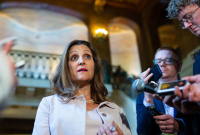Support strong Canadian climate journalism for 2025
Dozens of experts advising the government on adapting to climate change say Canada needs to do more to prepare infrastructure for the threats of extreme weather and get faster at helping Canadians recover from floods, fires and major storms.
Environment Minister Steven Guilbeault is set Monday to launch the second and last development phase for the national adaptation strategy that the Liberals promise will be ready by the end of the year.
The plan is supposed to show how Canada can become more resilient to the effects of climate change, and include a national monitoring and evaluation system to measure progress.
The first phase saw five expert panels on health, the economy, disaster resilience, natural and built infrastructure and nature submit advice to the minister on where they think the government should focus the plan.
Those plans were made public Thursday and many are looking for major transformations and improvements before the end of this decade.
The health panel said by 2030 health authorities need to have what they need to understand and address climate-related health risks, including infectious diseases and mental health.
New standards need to be embedded in the design and management of all infrastructure to make it both low-carbon and resilient to extreme weather.
And on the disaster resilience side, the experts say Canada has to do more to help when extreme weather hits.
The people of Lytton, B.C., can attest to that first hand. The town of about 250 was destroyed by a wildfire last June, after experiencing the hottest temperature ever recorded in Canada. Two people were killed and 10 months later, restoration work still hasn't begun.
Emergency Preparedness Minister Bill Blair visited Lytton Thursday and promised that disaster aid of at least $416 million will be allocated.
But Lytton's rebuilding has been stymied by a number of factors including more extreme weather. Last November, the roads into the town were washed out by floods that caused $5 billion in estimated damage across British Columbia.
The winter then brought the largest snowfall to Lytton it had seen in more than three decades.
The expert panel on disaster resilience said by 2030 Canada should be able to show a measurable reduction in the number of Canadians exposed to danger from extreme weather, and be able to make every victim of a natural disaster "whole again" within one year.
Lytton is not the only Canadian town hit with disasters back to back. Last summer, Red Lake, Ont., and several nearby First Nations were hit with forest fires for the second year in a row, prompting evacuations and destroying thousands of hectares of land.
On May 10, the municipality 500 km northwest of Thunder Bay, declared a state of emergency because floods have washed out sections of the highway leading into town.
Natural Resources Minister Jonathan Wilkinson said Friday at a news conference on forest fire preparations that no matter how successful Canadians are at cutting greenhouse gas emissions, the effects of global warming are already upon us, and this country has to do more to adapt.
"Canada is experiencing more frequent and more extreme wildfires and unfortunately that is not going to get better," he said. "This is a product of climate change and climate change that is baked into our future."
In the last two years, Public Safety Canada has been called on 14 times to help with out of control fires. In the five years before then, it was only needed four times.
Last summer, more than 4.3 million hectares were burned across the country, more than 1.5 times the 10 year average of 2.6 million.
Forecasters said Friday Canadians from B.C. to western Quebec can expect higher than average fire risks in June and July this year again.
Flooding is also a major risk, with more big flood events happening more frequently. Last week, floods had forced evacuations in Manitoba, Alberta, Northwest Territories and northwestern Ontario.
Until the 1960s, Canada marked about 30 climate-related disasters every decade. Now it's more than 100.
This report by The Canadian Press was first published May 16, 2022.




Comments
Natural Resources Minister Jonathan Wilkinson: "Canada is experiencing more frequent and more extreme wildfires and unfortunately that is not going to get better. This is a product of climate change and climate change that is baked into our future."
Don't be so modest, Minister Wilkinson. Take credit where credit is due:
"Canada is experiencing more extreme wildfires and expanding fossil fuel production at the same time. This is a product of Liberal climate policy as we lock in fossil fuels and bake our future."
The profits from new oilsands export pipelines, offshore oil platforms, and LNG plants will be dwarfed by the costs Canadians and wildlife pay for climate disaster prevention, reconstruction, repair, and losses.
Meanwhile, Canada's environmental liabilities continue to mount. $260 billion in the oilsands and rising.
"B.C., Ottawa not ready to shift from disaster response to disaster prevention" (May 15, 2022)
"At a press conference Friday, Federal Emergency Preparedness Minister Bill Blair and Natural Resources Minister Jonathan Wilkinson highlighted the existing federal commitments, including $516 million for wildfire response, money already announced as part of the 2022 budget, as well as $8.4 million for emergency planning and response through the First Nations Emergency Services Society.
"Postmedia’s four-month investigation found the cost of increased flood and wildfire protection was at least $13 billion. The cost is certainly much higher as only a third of 75 communities examined had a detailed, costed flood protection plan and analysis does not cover the entire province.
"In Abbotsford, alone, an updated flood protection plan could be as much as $2.8 billion. The costs to reduce wildfire risk could be as much as $6 billion.
"Jackie Tegart, the B.C. Liberal MLA for Fraser-Nicola, noted that billions of dollars have been spent responding to floods and wildfires, and that spending needs to be flipped to preparation and prevention.
"Richard Cannings, the federal NDP MP for South Okanagan-West Kootenay, said he’s been speaking to Blair about the need to spend more on adaptation 'ahead of disasters,' not just in response.
"'Up until now, the federal government has been very reactive,' he said. 'I’m trying to get the government to work with communities before disasters happen.'
"Cannings said it would make better financial sense for the federal government to spend on mitigation, but it’s difficult to encourage politicians to spend money for 'an unknown event in the future,' although 'it’s the right thing to do.'"
https://vancouversun.com/news/local-news/bc-ottawa-not-shifting-from-di…
Canadians will pay for Wilkinson's misplaced priorities with their lives and livelihoods.
Vote Liberal.